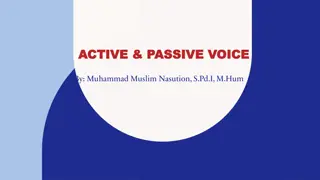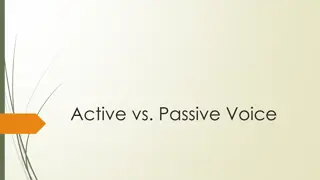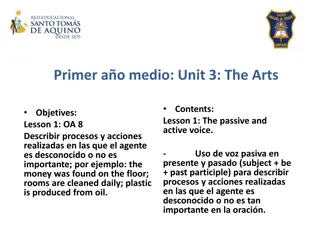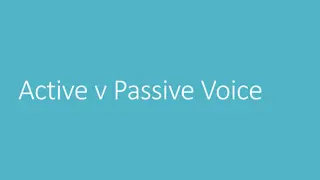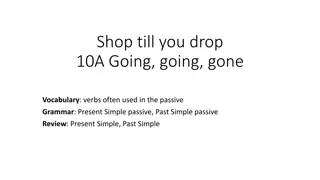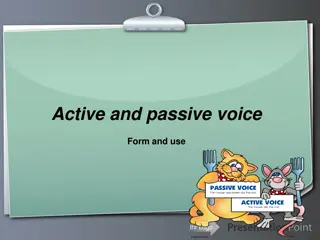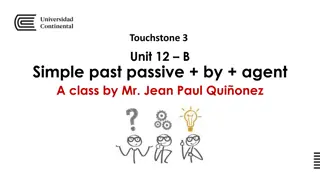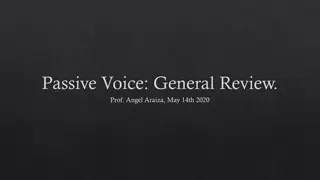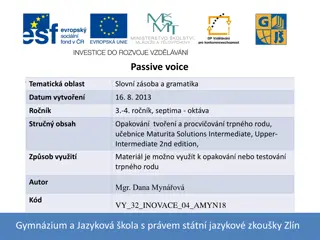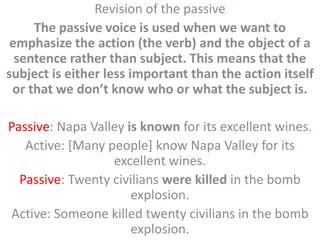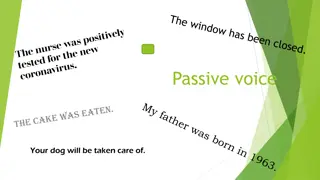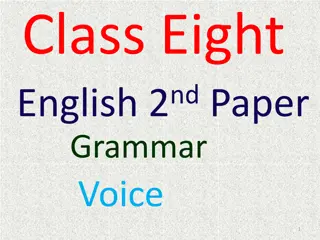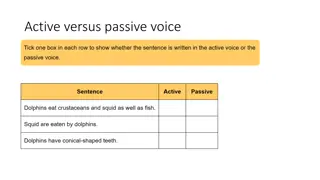Understanding Active and Passive Voice for Better Communication Skills
This content covers essential aspects of active and passive voice in communication skills. It explains the difference between the two voices, provides examples, and clarifies when to use passive voice. The importance of transitive verbs in forming passive sentences is highlighted along with intransitive verbs examples.
Download Presentation

Please find below an Image/Link to download the presentation.
The content on the website is provided AS IS for your information and personal use only. It may not be sold, licensed, or shared on other websites without obtaining consent from the author. Download presentation by click this link. If you encounter any issues during the download, it is possible that the publisher has removed the file from their server.
E N D
Presentation Transcript
PASSIVE VOICE for Communication Skills Course of Diploma 1styear --Dr. Sarla Verma Virtual Class Dr. SARLA VERMA Dr.B.R. AMBEDKAR POLYTECHNIC COLLEGE GWALIOR
ACTIVE VOICE Our usual pattern of sentence emphasizes the SUBJECT or the doer (actor). He threw the ball. Noun(subject) verb(Active voice)- Noun(object) N(S) - verb(act) - N(O) He gave me a book. Dr. SARLA VERMA Dr.B.R. AMBEDKAR POLYTECHNIC COLLEGE GWALIOR
PASSIVE VOICE Emphasizes the action or the verb activity. He threw the ball. The ball was thrown (by him). --Passive He gave me a book. --Active A book was given to me. -- Passive I was given a book. -- Passive Dr. SARLA VERMA Dr.B.R. AMBEDKAR POLYTECHNIC COLLEGE GWALIOR
Can we change any sentence into passive ? No, sentences with intransitive verbs can not be changed into passive. Only sentences with transitive verbs can be changed into passive. Perfect continuous tenses & Future continuous tense- Passive not used Dr. SARLA VERMA Dr.B.R. AMBEDKAR POLYTECHNIC COLLEGE GWALIOR
TRANSITIVE VERB TRANSITIVE VERB ldeZd fdz;k Verbs with object. Object receives the action. Effect of action is transferred from Subject to Object. Please bring coffee. Please bring him to me. To know the object of the verb -- Ask theVERB -- WHAT? or WHOM? The answer you get is the object. The verb is a TRANSITIVE VERB. Dr. SARLA VERMA Dr.B.R. AMBEDKAR POLYTECHNIC COLLEGE GWALIOR
TRANSITIVE VERB -Examples My family enjoys football. He gave me a pen yesterday. He invited all the friends to his birthday party. I have written a letter. Someone has stolen my pen. examples eat, drink, write, read, play, draw, watch, post, delivered, give, tell, wash, catch, find, send Dr. SARLA VERMA Dr.B.R. AMBEDKAR POLYTECHNIC COLLEGE GWALIOR
INTRANSITIVE VERB INTRANSITIVE VERB - vdeZd fdz;k verbs without object or verbs in which the action from subject is not transferred to the object. To know the object of the verb-- ASKVERB - WHAT? or WHOM? The answer you get is the object. If you do not get any answer it is an INTRANSITIVE VERB. Dr. SARLA VERMA Dr.B.R. AMBEDKAR POLYTECHNIC COLLEGE GWALIOR
INTRANSITIVE VERB -Examples He ran very fast. The child sleeps under the tree. My father walks four miles every day. Everybody laughed over the comedy. A guard stands at the College gate. Examples: Weep, sit, cry, go, come, return, arrive, work, talk, live, jump, shine, die Dr. SARLA VERMA Dr.B.R. AMBEDKAR POLYTECHNIC COLLEGE GWALIOR
Verb Transitive Intransitive move He moved his car. The trees were moving in the wind. The match starts at 3 p.m. start Mohan started the project. change She has changed her job. close Close your books. Bhopal has changed a lot in the last decade. The office closes at 5 p.m. open Open the windows for fresh air. He stopped the car. Let the rain stop, then we will move out. POLYTECHNIC COLLEGE GWALIOR The museum opens at 10 a.m. stop Dr. SARLA VERMA Dr.B.R. AMBEDKAR
Verb Transitive Intransitive do Please do this exercise regularly. He runs a restaurant in the city. wash Please wash your hands first. write Write your name here. live She was living a life of celebrity. He is doing well in his new job. He runs very fast but never wins the race. I washed, dressed and went to the party. He cannot read or write. run His father lived till he was ten years old. Dr. SARLA VERMA Dr.B.R. AMBEDKAR POLYTECHNIC COLLEGE GWALIOR
PASSIVE VOICE IS USED : The subject is not important in the sentence. It is not necessary to mention the subject. No meaningful information is contained in the subject. Speaker is interested in the verb activity not in the active subject. There is no question of responsibility or accountability or reward or punishment. Dr. SARLA VERMA Dr.B.R. AMBEDKAR POLYTECHNIC COLLEGE GWALIOR
Active Passive N2- verb(pass)- {byN1} (subject) (agent) N1 - verb(act)- N2 (subject) (object) 1. Find Object of the Verb Ask Verb- What/Whom? Object becomes the Subject 2. Find verb Change the verb into 3rd form and use helping verb as per the new subject. (Tense remains the same) 3.Find out if Subject can be omitted or it is needed to complete the meaning? Subject is mentioned as agent only if necessary. Dr. SARLA VERMA Dr.B.R. AMBEDKAR POLYTECHNIC COLLEGE GWALIOR
Changing Object to Subject SUBJECT OBJECT me us you him her them POSSESSIVE my , mine our, ours your, yours his her, hers their, theirs I we you he she they it who it its Dr. SARLA VERMA Dr.B.R. AMBEDKAR POLYTECHNIC COLLEGE GWALIOR whom whose
Changing into Passive- verb throw throw is/am/are thrown threw was/were thrown shall/will throw shall / will be thrown is/ am are throwing is/am/are being thrown was/were throwing was/were being thrown has/have thrown has/have been thrown had thrown had been thrown shall /will have thrown shall/will have been thrown Dr. SARLA VERMA Dr.B.R. AMBEDKAR POLYTECHNIC COLLEGE GWALIOR
Simple Present draw People always admire his paintings. is/am/are drawn People speak English all over the world. Passive: His paintings are always admired. English is spoken all over the world. Dr. SARLA VERMA Dr.B.R. AMBEDKAR POLYTECHNIC COLLEGE GWALIOR
Simple Past drew He hurt his leg in an accident. They invited me to give a talk on participative management. The enquiry committee held the police responsible for the stampede. PASSIVE: His leg was hurt in an accident. I was invited to give a talk on participative management. The police was held responsible for the stampede. was/were drawn Dr. SARLA VERMA Dr.B.R. AMBEDKAR POLYTECHNIC COLLEGE GWALIOR
Simple Future will/shall draw will/shall be drawn People will forget this incident in a few years. We shall discuss the matter tomorrow. PASSIVE: This incident will be forgotten in a few years. The matter will be discussed tomorrow. Dr. SARLA VERMA Dr.B.R. AMBEDKAR POLYTECHNIC COLLEGE GWALIOR
Present Continuous Tense is/am/are drawingis/am/are being drawn Workers are repairing the school building. The committee is reconsidering the decision. PASSIVE: The school building is being repaired. The decision is being reconsidered. Dr. SARLA VERMA Dr.B.R. AMBEDKAR POLYTECHNIC COLLEGE GWALIOR
Past Continuous Tense was /were drawing was/were being drawn They were decorating the stage for inauguration. People were enjoying the show. PASSIVE: The stage was being decorated for inauguration. The show was being enjoyed. Dr. SARLA VERMA Dr.B.R. AMBEDKAR POLYTECHNIC COLLEGE GWALIOR
Present Perfect has/have drawn has/have been drawn The committee has prepared the detailed plan of the project. He has done all the problems of this exercise. PASSIVE: The detailed plan of the project has been prepared. All the problems of this exercise have been solved. Dr. SARLA VERMA Dr.B.R. AMBEDKAR POLYTECHNIC COLLEGE GWALIOR
Past Perfect had drawn had been drawn No one had informed me about the party. They had repaired all the machines timely. PASSIVE: I had not been informed about the party. All the machines had been repaired timely. Dr. SARLA VERMA Dr.B.R. AMBEDKAR POLYTECHNIC COLLEGE GWALIOR
Future Perfect Tense Will/shall have drawn Will/shall have been drawn The painter will have painted this picture by 5p.m. They will have completed the construction work before July. PASSIVE: This picture will have been painted by 5 p.m. The construction work will have been completed before July. Dr. SARLA VERMA Dr.B.R. AMBEDKAR POLYTECHNIC COLLEGE GWALIOR
Introductory It It is said that.... People say......... People say that tortoises live longer than elephants. It is said that tortoises live longer than elephants. Or Tortoises are said to live longer than elephants. The scientists believe that there is no life on Mars. It is believed that there is no life on Mars. Dr. SARLA VERMA Dr.B.R. AMBEDKAR POLYTECHNIC COLLEGE GWALIOR
May, might, must, ought to He may lock his house. His house may be locked. The committee might approve the proposal this week. The proposal might be approved this week. Somebody must finish the work. The work must be finished. People ought to take care of old people. Old people ought to be taken care of. Dr. SARLA VERMA Dr.B.R. AMBEDKAR POLYTECHNIC COLLEGE GWALIOR
Can, could, shall, should No one can answer your question. Your question can not be answered. They could do it easily. It could be done easily. The publisher should publish the new edition soon. The new edition should be published soon. We shall take care of this issue. This issue will be taken care of. Dr. SARLA VERMA Dr.B.R. AMBEDKAR POLYTECHNIC COLLEGE GWALIOR
Special sentences - Imperative Draw Post this letter. Let be--drawn Let this letter be posted. Let this painting be hanged on the wall. Hang this painting on the wall. Let God be thanked. or God should be thanked. Thank God. Dr. SARLA VERMA Dr.B.R. AMBEDKAR POLYTECHNIC COLLEGE GWALIOR
When the subject is essential in the passive for complete meaning use by I was deeply struck by her beauty. Her beauty struck me deeply. He was surprised by my presence. My presence surprised him. He was motivated by his confidence to find a solution. His confidence motivated him to find a solution. Dr. SARLA VERMA Dr.B.R. AMBEDKAR POLYTECHNIC COLLEGE GWALIOR
USE PASSIVE VOICE PURPOSEFULLY AND SMARTLY TO WIN FRIENDS AND PEOPLE. It was such an expensive watch. You have lost it. The watch is lost. It was an expensive one. You have broken one glass. It was my imported set of glassware. Oh! Its broken. Are you injured ?? It was my imported set ......... Post this letter. Let this letter be posted. or This letter needs to be posted urgently. Let the table be laid. Lay the table. Dr. SARLA VERMA Dr.B.R. AMBEDKAR POLYTECHNIC COLLEGE GWALIOR
THANKS dr_sarlaverma@rediffmail.com Dr. SARLA VERMA Dr.B.R. AMBEDKAR POLYTECHNIC COLLEGE GWALIOR




